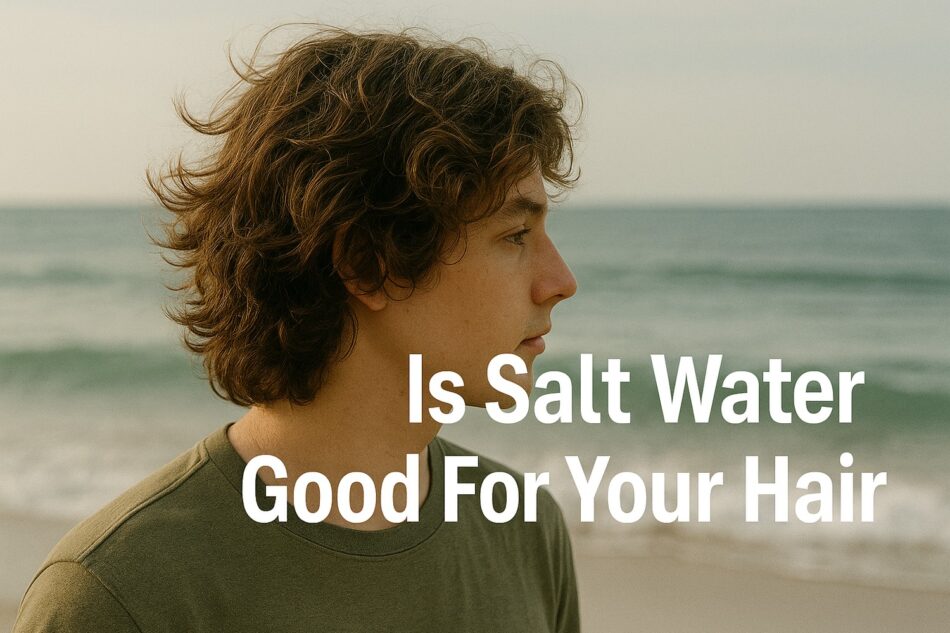The allure of beach waves, the refreshing feel of ocean spray for many, salt water and summer go hand-in-hand. But beneath the romanticized image of sun-kissed hair lies a question that plagues many a beachgoer and ocean enthusiast: is salt water bad for your hair? While it can offer some temporary styling benefits, the long term reality is that frequent exposure to salt water can, indeed, take a toll on your locks. Let’s dive deep into the science and separate the myths from the salty truth.
The Science Behind Salt Water and Hair
To understand the effects of salt water, we need to consider what salt (primarily sodium chloride) does to hair on a microscopic level. Our hair strands are covered by an outer layer of cuticles, like overlapping shingles on a roof. These cuticles protect the inner cortex, which contains keratin, the protein that gives hair its strength and elasticity.
How Salt Water Dehydrates
The primary mechanism by which salt water affects hair is dehydration. Salt is a hygroscopic substance, meaning it attracts and holds water molecules. When salt water comes into contact with your hair, it draws out moisture from within the hair shaft. This process, known as osmosis, leads to a significant loss of internal hydration.
Roughing Up the Cuticle
Beyond dehydration, salt crystals can also physically roughen the hair cuticle. As the salt water evaporates, it leaves behind tiny salt crystals that can abrade the delicate outer layer of the hair. This roughened cuticle makes the hair more prone to tangling, frizz, and a dull appearance, as light is no longer reflected smoothly.
The Visible Effects: Signs of Salt Water Damage
Regular exposure to salt water manifests in several noticeable ways, none of which are particularly flattering for your hair.
Dryness and Brittleness
The most immediate and pervasive effect of salt water is extreme dryness. Hair that was once soft and pliable can become stiff, coarse, and straw-like. This lack of moisture also leads to increased brittleness, making the hair more susceptible to breakage, especially when combing or brushing.
Frizz and Tangling
With a compromised cuticle layer, hair struggles to retain its natural smoothness. This results in an increase in frizz, as individual hair strands rebel and stand out. The roughened cuticles also snag on each other, leading to significant tangling and knotting, making detangling a frustrating and damaging ordeal.
Dullness and Lack of Shine
Healthy hair has a natural luster due to its smooth cuticle layer reflecting light. When salt water damages the cuticles, the surface becomes uneven, scattering light rather than reflecting it. This leads to a noticeable dullness and a loss of the vibrant shine that characterizes healthy hair.
Color Fading
For those with color-treated hair, salt water poses an additional threat. The drying effect of salt water can accelerate the fading of hair dye, making your vibrant color appear dull and washed out more quickly. The lifted cuticles also make it easier for color molecules to escape the hair shaft.
Protecting Your Tresses: Minimizing Salt Water’s Impact
While completely avoiding salt water might not be an option for beach lovers, there are several effective strategies to mitigate its damaging effects.
Pre Soak and Condition
Before taking a dip in the ocean, thoroughly wet your hair with fresh water and apply a leave-in conditioner. Your hair can only absorb so much water, so by saturating it with fresh water first, it will absorb less of the salty ocean water. The conditioner creates a protective barrier, further shielding your hair from the salt.
Rinse Immediately
As soon as you’re out of the ocean, rinse your hair thoroughly with fresh water. This is perhaps the most crucial step in minimizing damage. Rinsing immediately washes away the salt crystals before they have a chance to fully dehydrate and abrade your hair.
Use Gentle Cleansing and Deep Conditioning
After a day at the beach, opt for a gentle, sulfate-free shampoo to cleanse your hair without stripping it further. Follow with a rich, hydrating conditioner, and consider incorporating a weekly deep conditioning treatment or hair mask to replenish lost moisture and repair damaged cuticles.
Protect from the Sun
The sun’s UV rays can exacerbate salt water damage. Wear a wide-brimmed hat or use a UV-protective hair spray to shield your hair from the sun while enjoying the outdoors.
Conclusion
While the allure of ocean-kissed hair is undeniable, the scientific reality is that salt water can be detrimental to hair health, leading to dryness, brittleness, frizz, and dullness. The good news is that with a little proactive care and a few smart habits, you can enjoy the ocean without sacrificing the health and beauty of your hair. By understanding how salt water affects your strands and implementing protective measures, you can minimize the damage and keep your hair looking its best, even after a refreshing dip in the salty sea.








